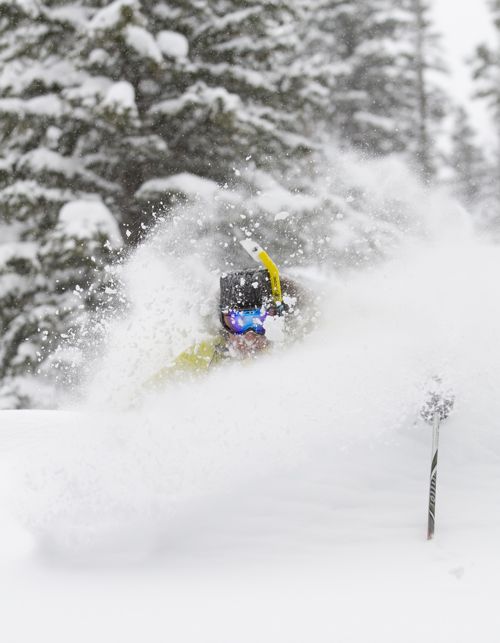Endurance and the Snowy Season

Its easy to forget how exhausting a day in the snow often turns out to be, when getting excited about vacation or a day on the hill and such is fed by Warren Miller movies or Seth Morrison videos. You may not see it in extreme videos, ski games, or on the smiling faces of winter-sports related websites, so its easy for it to slip out from under the radar. Visitors and getaway locals have every right to be excited, but keep in mind- you will be tired, especially:
- If its snowing out.
- If you haven’t skiied within a couple of weeks -or-
- If your regular exercise routine does not involve lunges and squats.
- If you are an intermediate skier or better using rental ski boots.
- If you don’t bring water on the slopes with you.
- If you don’t already live in a high-altitude environment.
- If you drink the night before.
The love for skiing often presents itself as an oxymoron- the “best” deep powder conditions are what bring people to the Vail Valley, yet they are the toughest and most exhausting to enjoy. Furthermore, the snow can cause dramatically decreased visibility and slow reaction time (think driving in the snow,) which become even more exhausting as the skier / rider has far less time to decide his / her path and must often react intuitively to obstacles or snow anomalies that cannot be seen through slightly fogged goggles. The falling snow on 1/7/08, was thick, heavy, and never stopped. In addition, it got heavier and thicker as the day progressed, so rather than getting “skied off” the ground was thick with heavy, wet snow with zero visibility. This made the last run of the day, a cat-walk from Beaver Creek to Bachelor Gulch, extraordinarily arduous and even more fatiguing as we fought the snow back to the car without the ability to see. An abundance of snow is what many folks are looking for, but many remain unprepared for. At least I personally felt like I had been warned.
Maximal enjoyment of a ski trip does deserve some preparatory exercise- even if just to gauge ones standing endurance and to know what to expect. To get an idea of your fitness level, try 10 lunges on each side. Are you able to complete them? How do your legs feel? Remember that while you ski, effort from these muscles is going to be demanded on every turn, every jump, and every stop. Being able to do 100 of both lunges and squats every day is a good indicator that a good day of skiing won’t result in complete exhaustion or soreness.
The trouble with ski boots is that they require such an exact fit to make the most of the motion of your foot. Maximum control comes from being able to use all sides of a foot, especially the heel, the outer edge, and the inner heel/ankle. Rental boots often leave gaps in some of these areas, and the skier has the choice of either not being able to ski as well or over-compensating with other muscle groups to exact the motion he / she has prepared. When the latter takes over, further exhaustion can happen, as can frustration.
Skiing and riding are intensive exercise- stay hydrated, just as you would jogging or playing soccer. Get a Camelback- the advantage being that your water is out of the way, yet accessible, and centered over your bodyweight, so is in effect less “heavy.” Camelbacks come in winter sports models to fit over a large jacket, or backpack models, to stash extra stuff. One liter models are light and will last most, if not all day. In Avon, near Beaver Creek, pick one up at Venture Sports.
Altitude has an effect on the physique all its own, outside any physical stress one may induce by skiing or other activity. Altitude affects everyone differently, and can have major adverse effects on energy levels in otherwise healthy people. Read more about Altitude Sickness from the National Institute of Health and get Altitude Sickness advice here. Think you may have altitude sickness? Doctors are standing by with oxygen tanks. An additional dose of oxygen is all you may need to start feeling better.
For a great day skiing, it is best to get plenty of rest and hydrate the body the night before. Alcohol has the opposite effect, and in higher altitude, can “act faster,” resulting in a worse hangover the next day, that will be less easily shaken, as the air is thinner and drier, and may in addition induce altitude sickness.
Truth is, you’ll have fun no matter what you do, as long as you don’t get injured. So slow down, take it easy. Most injuries occur in fatigued moments, which can result from any of the above. Enjoy the view! and be sure to read our posts about taking a day off.